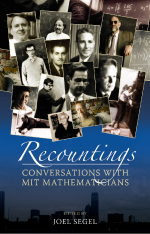Excerpts from Recountings: Conversations with MIT Mathematicians

Edited by Joel Segel, son of mathematician Lee Segel (MIT PhD under C.C. Lin, 1959), the book Recountings: Conversations with MIT Mathematicians (A K Peters, 2009) weaves together some of the storied history of the Mathematics Department of MIT through the anecdotes of our mathematicians. The book was published in 2009 and is available from Amazon and from the publisher.
The following are excerpts from the book.
"God does provide—but for the physicists" (Ken Hoffman)
What [the David Committee] discovered was that there was a point in history going back to the mid '60s where mathematical research was funded very well by the federal government, but the mathematicians just let all the money go away. We lost half of the federal research funding for mathematics in a span of four or five years. This was connected with the Mansfield Amendment, which was only in effect for one year; but it was an amendment that put strict strictures on the Department of Defense about what it could fund on the research end. It could only funds things directly connected to the immediate mission of the Defense Department. As a result of that, the funding of all these things like the Air Force Office of Scientific Research that I talked about and research grants to numerous mathematicians that funding was all moved from DOD to NSF.
The only trouble is that it never got to the mathematicians, because the mathematicians were asleep at the switch, see? So it all went into physics and chemistry, because physicists and chemists ran everything at NSF! That's how when youre asleep, you pay a big price. I said to Ed David once that the mathematicians believe in the theory that God will provide. He said, "That's correct. And God does provide—but for the physicists."
"Consider it done" (Ken Hoffman)
I was sitting in my office one day; the phone rang, and there was Jerry. He quickly described where he stood on his idea of the Independent Activities Period, and he called to ask if the Commission could help. By "help" he meant persuade more people on the faculty that this was a good idea. I got hold of Sam Bodman, because he was a man of action. I called him in, and I explained to him: "Sam, Jerry's got this Independent Activities Period idea. Here's the idea, in a nutshell, and he really wants to get this done, but he's getting a lot of faculty resistance, most of it coming from the School of Engineering. So what I want you to do, Sam, is take time off from whatever you were doing for this Commission and work full time: you become the floor manager for putting this through the faculty of MIT."
Sam looked at me and he said, "Consider it done."
And he left. He never talked to me further about what he did, but when it came up next in the faculty, it passed easily. So when he became the Secretary of Energy of the United States, I said, "I wonder if Bush knows what he has hold of there." [Laughs.] This guy is real doer!
"Memorable immiscibility" (Hartley Rogers)
I recall that one evening we had Claude [Shannon] and Noam Chomsky, another friend of mine whom I much admired, to dinner at our apartment. Noam had audited a graduate probability course I gave at Harvard. The dinner, as a social occasion, turned out to be one of memorable immiscibility.
Driving Dr. Einstein (Bert Kostant)
I met Einstein on Good Friday in 1955, about a week or so before he died. He was pacing around Fuld Hall looking for Jack, the driver of the Institute bus. But Jack was off that day, apparently because of the Good Friday holiday. Einstein often walked home with Gödel, but I think Gödel was not around. I was the only one sitting in the Fuld Hall common room, and I said, "I'll be happy to drive you. It will be an honor."
"Ohhh." [Waving off the compliment.] So I drove him to 112 Mercer Street. I was very nervous. God forbid I should have an accident!
How the department chilled out... (Dan Kleitman)
People in pure mathematics had no contact with [computers]. I said, we've got to change that attitude, and we've got to get people to at least know what personal computers are! So I bought computers for everybody.
Also, I had another goal: to try to get the department air conditioned. They wouldn't do it for just plain people, but if you have computers you need air conditioning, so that they won't rot. They were more sensitive in the old days to fluctuations in temperature. So that was one reason. You know, one tends to think a decision is done for a purpose. But human decisions are threshold affairs. There's this aspect and that aspect, and when the planets are all in sync, then somebody makes the decision to do something. So each little thing helps.
